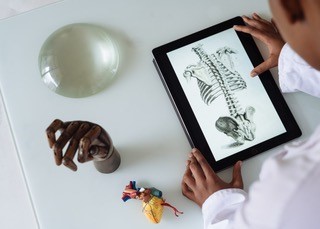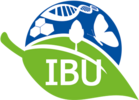Johanna Arndt
Curriculum vitae
2010-2013 | Study of biology at the Johannes Gutenberg University in Mainz Degree: Bachelor of Science |
Topic of the bachelor thesis: A Bornesian ant community structured by competition, space, time and food | |
2014-2018 | Studies of Biology and English Language and Literature (two-subject Bachelor) at the Carl von Ossietzky University Oldenburg. Degree: Bachelor of Arts |
2018-2020 | Study of Biology and English Studies at the Carl von Ossietzky University Oldenburg Degree: Master of Education |
Master's thesis topic: Genome editing in Arabidopsis thaliana: A CRISPR-Cas 9 mediated multiplexed loss-of-function mutation in TOPLESS. | |
Since 2020 | Research assistant and doctoral student at the Carl von Ossietzky University Oldenburg, IBU, Biology Didactics Group |
Research

Project: "Innovative teaching and learning concepts: Innovation plus"
Use of digital media in practical courses in biology didactics
Whether we are working on a concept collaboratively with our colleagues via the cloud at work or sending a quick text message to our family member to make sure we don't forget the milk when we go shopping: digital media have long since arrived in our professional and private everyday lives. And since the beginning of the Corona crisis, everyone has noticed the increased importance of digitalisation. Teaching digital skills is a special challenge for schools, because they are a prerequisite for students' successful participation in our digital knowledge society. However, the Deutsche Telekom Foundation was able to show that there is a need to catch up in the promotion of computer and information-related student competencies by teachers in Germany (2017). In terms of teaching digital literacy, teachers play a crucial role: they should be competent in the use of technology and its possibilities and provide students with an appropriate selection of digital media that at the same time avoid a "cognitive overload" (Lewis, 2016). According to the ICILS study, which investigated digital competences in 14 education systems worldwide (Eickelmann, 2019), so far only a quarter of teachers in Germany claim to have learned how to use digital media in the classroom during their teacher training. Therefore, it seems important to integrate the teaching of digital competences more strongly into the training phase. Teachers are responsible for selecting digital media, adapting them didactically and integrating them methodically, and finally evaluating their effectiveness in terms of learning gains. For the implementation of digital media within the boundaries of this project, the use of iPads was prioritised in a laboratory event close to school practice. The focus on the iPad as a suitable medium is based on the fact that tablets (and iPads in particular) are frequently used in schools; so-called "iPad classes" are no longer exceptions (Aufenanger & Bastian, 2017). With a large number of educational apps that can be provided by the tablets, they offer a good opportunity to embed the use of digital content into the internship event. Through the character of such an internship event, student teachers also have the opportunity to test applications in classroom-based concepts, to practise the teaching of digital tools in learning groups and to undertake joint reflection and evaluation of media use. Empirical accompanying research will primarily investigate attitudes, self-concepts, possible difficulties in dealing with digital tools as well as benefits and relevance for future professional life. This accompanying research is also to serve as a form of course evaluation. The "Innovation plus" project is a programme funded by the Lower Saxony Ministry of Science and Culture to implement innovative ideas for university teaching: www.mwk.niedersachsen.de/startseite/aktuelles/presseinformationen/dreimillionen-euro-fur-das-programm-innovation-plus-183851.html
Further information:
Literature:
- Aufenanger, S., & Bastian, J. (2017). Introduction: Tablet use in schools and classrooms - where do we stand? In J. Bastian & S. Aufenanger (Eds.), Tablets in schools and classrooms: Research methods and perspectives on the use of digital media (pp. 1-11). Wiesbaden: Springer Fachmedien Wiesbaden.
- Deutsche Telekom Foundation. (2017). Schule digital - Der Länderindikator 2017. Retrieved from www.telekom-stiftung.de/projekte/schule-digital-derlaenderindikator
- Eickelmann, B., Bos, W., Gerick, J., Goldhammer, F., Schaumburg, H., Schwippert, K., Senkbeil, M. & Vahrenhold, J. . (2019). ICILS 2018 report volume Germany (W. Verlag Ed.). Münster, New York.
- Lewis, P. J. (2016). Brain Friendly Teaching-Reducing Learner's Cognitive Load. Acad Radiol, 23(7), 877-880. doi:10.1016/j.acra.2016.01.018.




